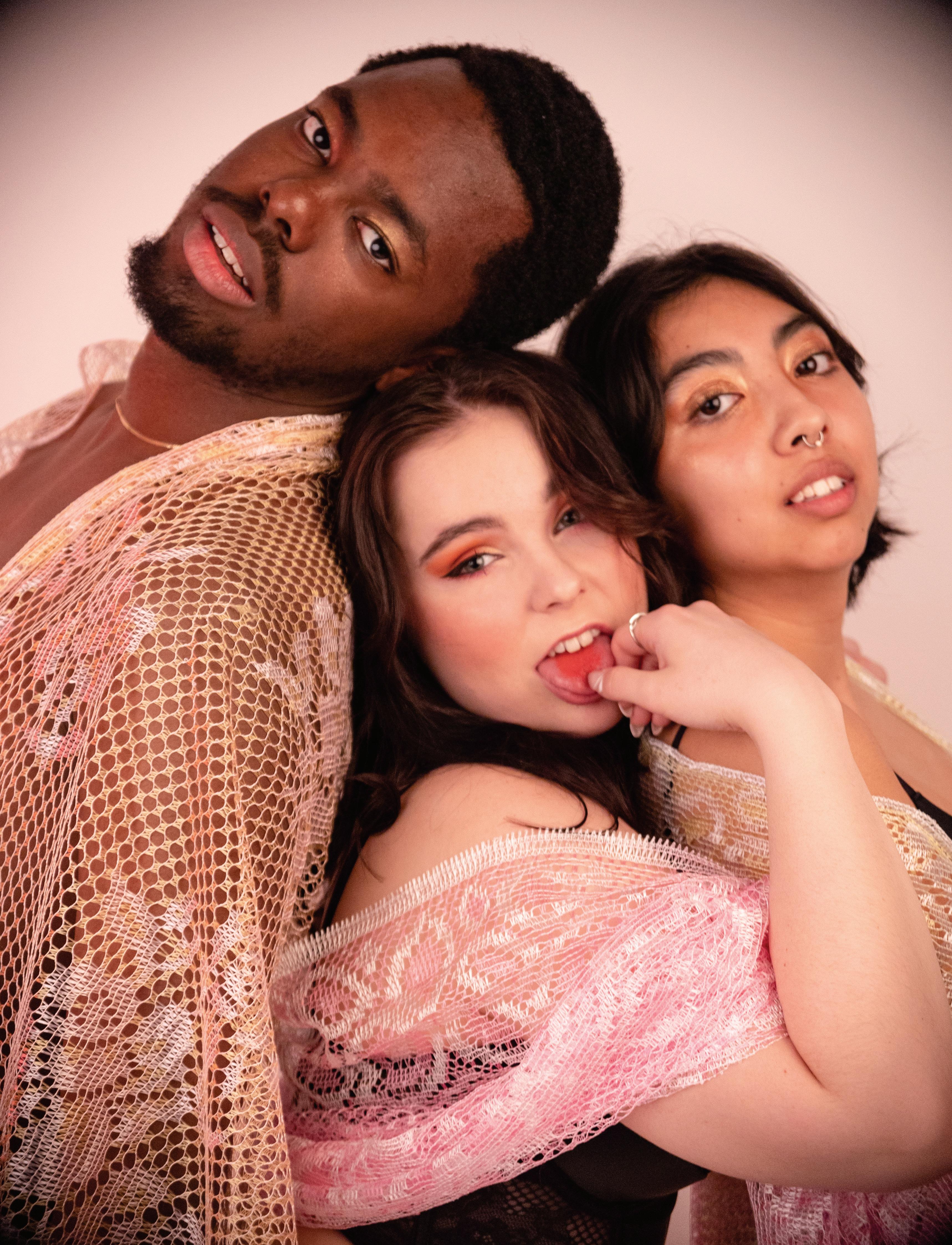SEX ISSUE

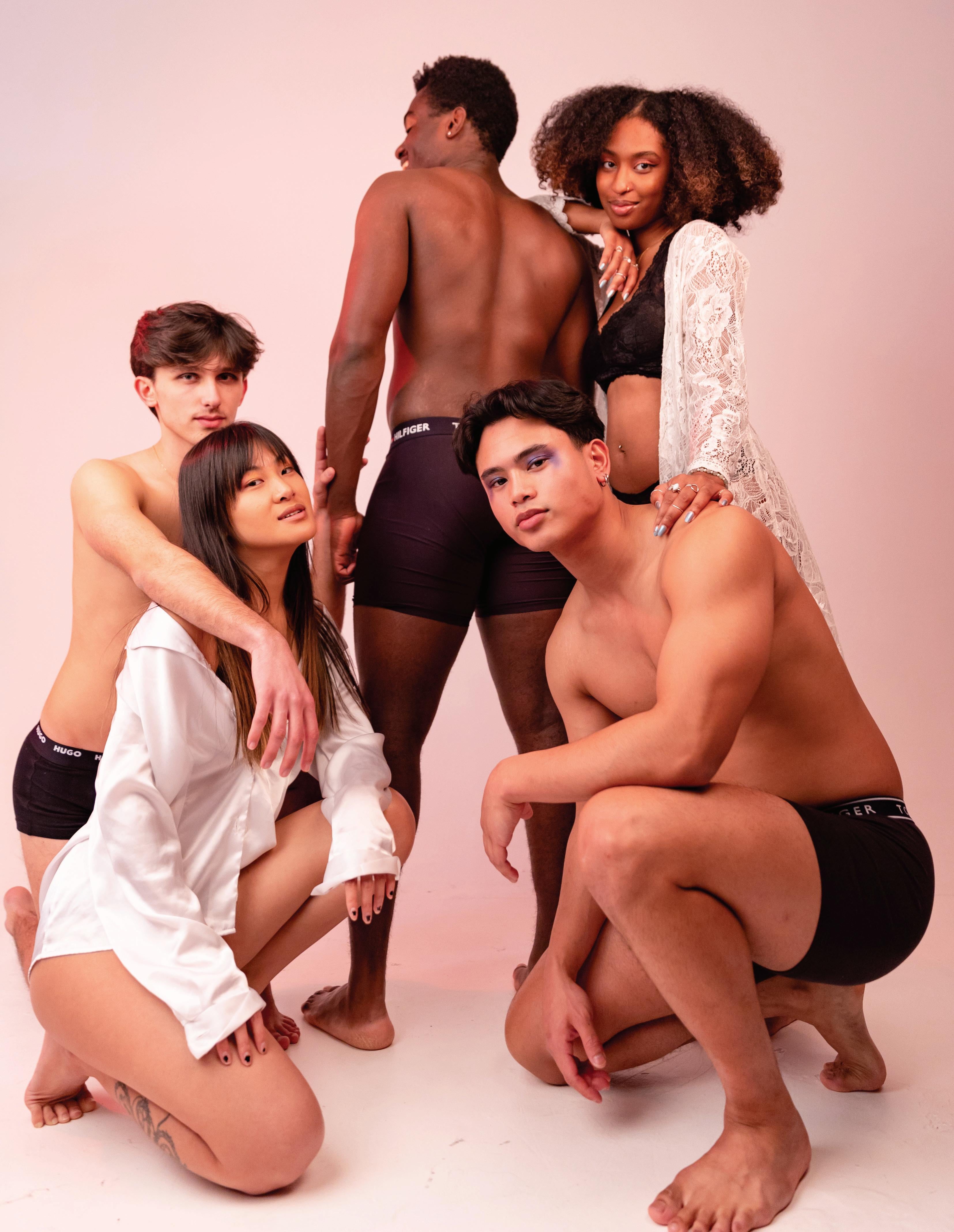



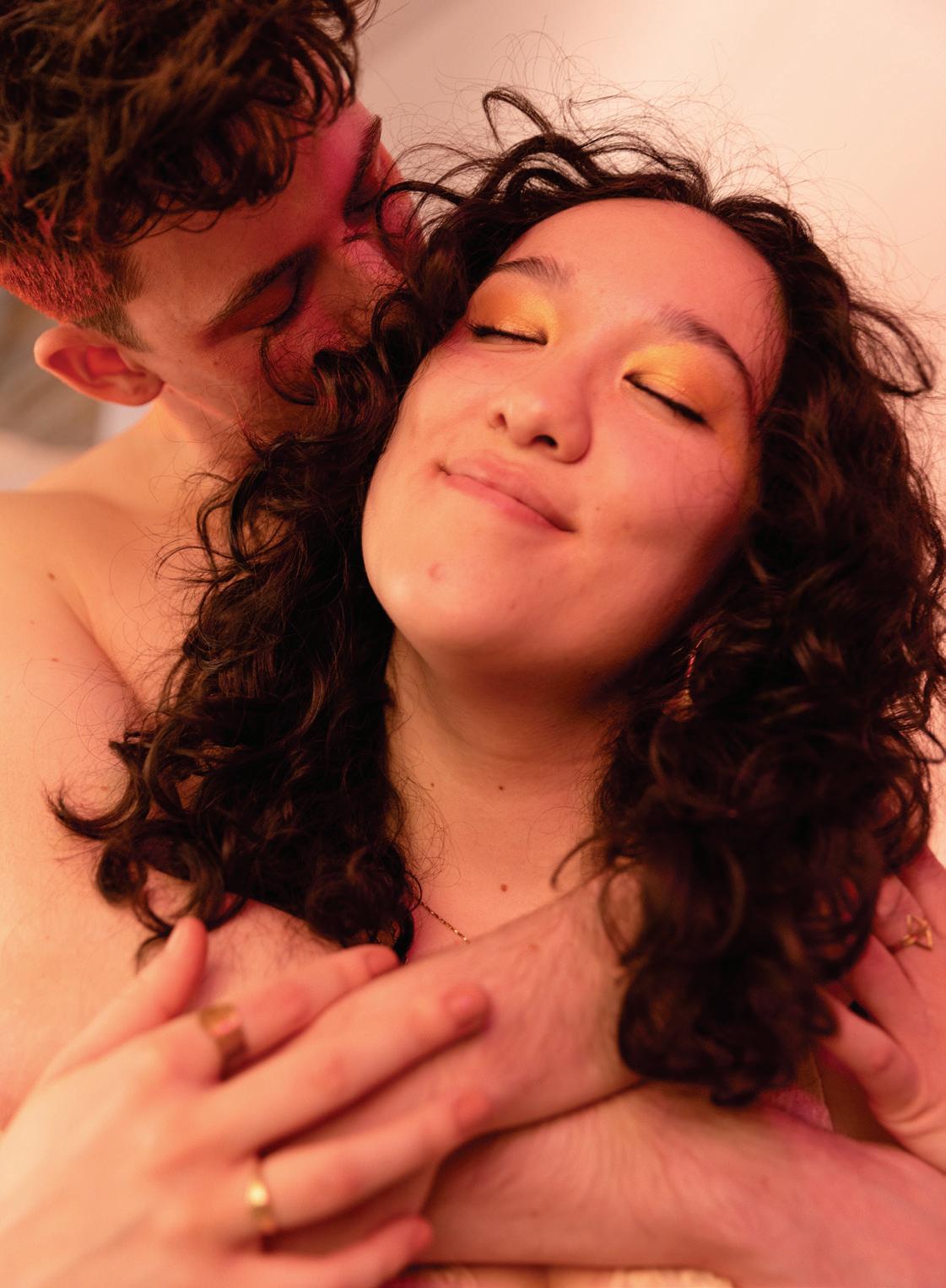
Editor-in-Chief
Hope Mahood
Managing Editor
Sarah Wallace
Deputy Editor
Alex McComb
Art Director
Cassandra Kaczmarski
Coordinating Editors
Bianca Collia
Lucas Arender
Lead Photographer
Sophie Bouquillon
Writers
Hannah Alper
Miles Bolton
Ryan Goodison
Elizabeth Hart
Scott Yun Ho
Khushi Kumari
Quinn Lee
Madeleine McColl
Lauren Medeiros
Danielle Paul
Sonia Persaud
Estella Ren
Adshayah Sathiaseelan
Sophia Schiefler
Rebecca Streef
Catrina Tang
Robin Wang
Andy Yang
Models
Emmanuel Akanbi
Janelle Allan
Jeremy Brand
Anjelique Croteau
Teigan Elliott
Noah Matsakawo Fugar
Sanjana Jones
Ben King
Paula Ocampo
Sthuthi Satish
Jasmin Skinner
Anjali Venga
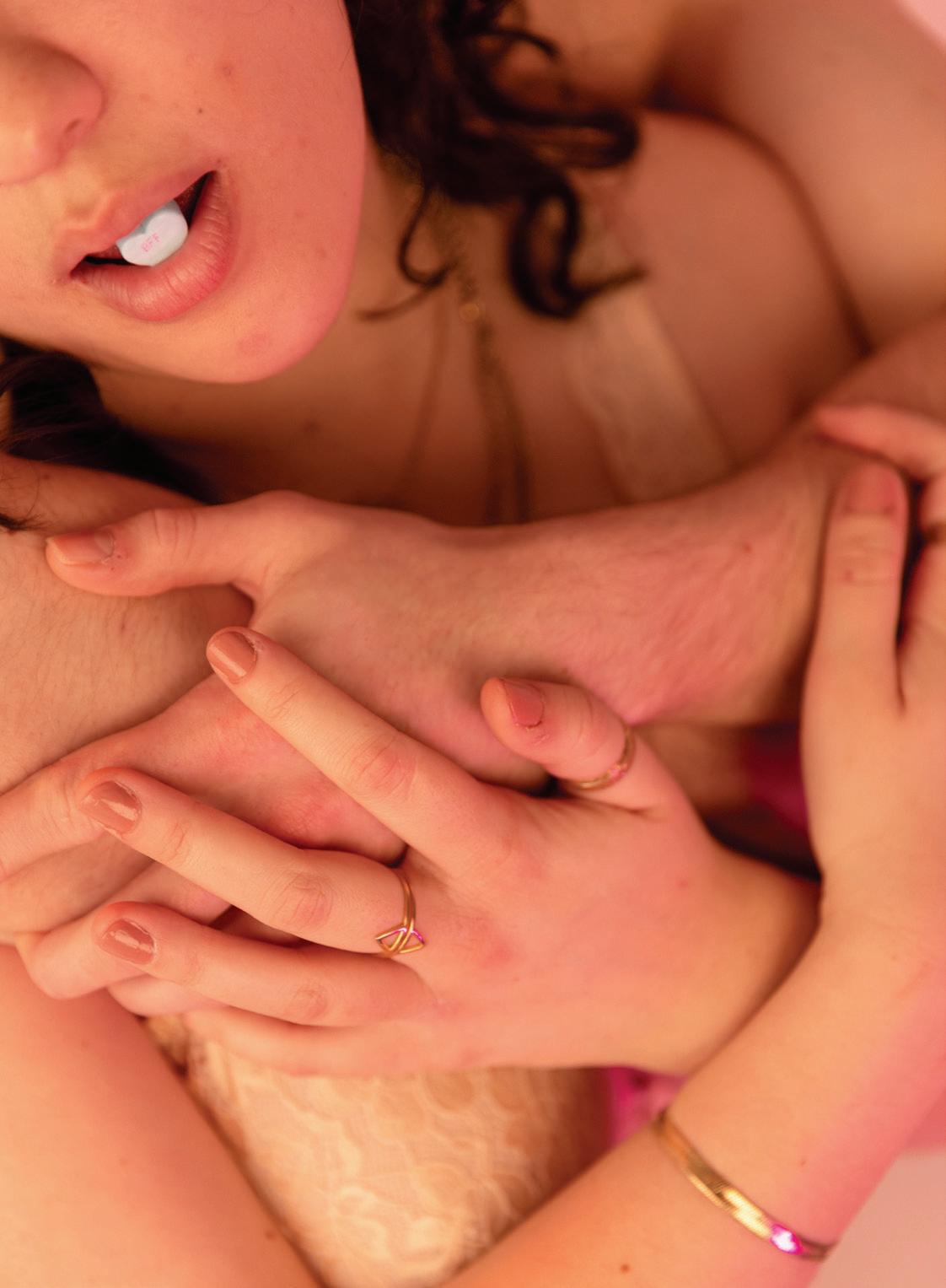
Philippe Ytac
Photographers
Sophie Bouquillon
Lucas Arender
Editorial Support Manager
Dan Brown
Copy
Elizabeth Hart
Scott Yun Ho
Graphics & Layout
Jessica Counti
Katherine Guo
Rebecca Streef
Cassandra Kaczmarski
Video
Mina Ahmad
Rebecca Bartkiw
Madeleine McColl
Romano Watt
WhenAiden Dufault wants to talk about his dating life, he turns to his ex-boyfriend.
Dufault and his ex ended on amicable terms. While they took some time apart initially after the breakup, the two now consider each other good friends.
“I decided to stay friends [with them] because I don’t have a lot of gay male friends,” says Dufault. “I wanted to have someone as a friend who has that same lived experience I’ve had, that you just can’t get with someone who’s heterosexual.”
While it may seem like a hard concept to some heterosexual people, remaining friends with ex-partners isn’t that unusual in the LGBTQ2+ community.
The specific reasons why some LGBTQ2+ people choose to remain close with their exes aren’t universally agreed upon, and it’s definitely not a one-size-fits-all.
According to Andie Shabbar, a professor in gender, sexuality and women’s studies at Western University, LGBTQ2+ relationships have always existed outside of the standards of heteronormative culture — including “norms” of what a relationship with an ex-partner should be.
“Queer people are often outcasts and rebels and pioneers when it comes to love and relationships in our heteronormative culture,” says Shabbar. “It’s a world-making practice.”
For Dufault and many others in the LGBTQ2+ community, an important part of that world-making practice is
the unique kinship found in former romantic partners.
“We’re both gay, and that dating experience is so unique,” says Dufault. “[My ex is] one of the only people I know who really gets it, so I go to him.”
While there have been studies done, like one at Oakland University, on the specific reasons why some people choose to stay friends with their exes, they’ve only included “cross-sex” exes — former romantic relationships where partners were of the opposite sex.
The Oakland University study sampled 860 people in cross-sex post-romantic friendships identified seven categories of reasons why they chose to stay friends with ex-partners: reliability and sentimentality, pragmatism, continued romantic attraction, children and shared resources, diminished romantic attraction, social relationship maintenance and sexual access.
However there’s little data on the post-breakup behaviours of LGBTQ2+ people in same-sex post-romantic friendships.
Shabbar says it doesn’t surprise her that there aren’t statistics on LGBTQ2+ exes.
“Another thing about queer communities and culture is that a lot of it’s ephemeral,” says Shabbar. “A lot of it is not something you can point to because it’s that way of life, it’s hard to gather statistics on how people are feeling about one another.”
Dufault’s relationship with his ex hasn’t been without its issues. He says
his first partner following his ex felt threatened by their friendship. When his partner asked Dufault to cut off his ex, he said no.
“I’m not going to end a friendship that means something to me,” says Dufault. “Now I have a rule and my current partner is great about it. This is a fact: I do talk to my ex, we are friends.”
Dufault’s advice for someone trying to ease their partner’s worries about an ex is to try and explain to them why you and your ex broke up. Even better, introduce them to each other — when your partner sees you and your ex interact with each other, it can confirm there’s nothing going on, while humanizing the past partner.
But besides jealousy from current partners, being friendly with exes can pose other problems as well. Shabbar notes it can be difficult for LGBTQ2+ people to leave abusive relationships if there’s that expectation of remaining friendly afterwards.
“Whenever you’re trying to define what is expected of a group of people or community, you’re always going to run into some problems,” says Shabbar. “That might create some ostracization, or feel a bit difficult if that expectation to remain friends after a relationship is there.”
For Dufault, his friendship with his ex is a positive and meaningful relationship in his life. He feels grateful.
“He’s not my absolute best friend, but he is a good friend of mine and someone I see when we can,” says Dufault. “I love talking to him.”

Thereis truly no other place in London where you can show up with your friends on a weeknight, have a drink and leave with a free pair of fuzzy handcuffs or a vibrating cock ring.
Every Tuesday at 9 p.m., The Ceeps is buzzing with energy, as students fill up tables on the dance floor, gearing up for what’s considered a rite of passage for Western University students: Sex Toy Bingo.

The rules are simple. Each attend-
ee receives a sheet of paper with four mini bingo grids and uses raw macaroni to mark their squares. The letters and numbers are called out by the bingo hosts, Colin and Matty, who have been cracking raunchy jokes and handing out vibrators — which they call “battery-operated boyfriends” — since 2007.
Once you successfully get a line on your bingo sheet, you have five seconds to make your way to the centre stage for the hosts to see. If more than one
person gets bingo, they must rock-paper-scissors their way to winning the prize. The prize is announced before each round, so bingo-goers know exactly what they’ll be going home with — be it anal beads fit with an easy retrieval ring or a pocket asshole.
“We’re not comedians, this is just what we do for a fun Tuesday night,” says Colin. “The way we look at it is, it doesn’t matter what your gender identy is — if you’ve got an asshole, we’ll make fun of it.”
When Colin and Matty took over Ceeps’ infamous Tuesday bingo in 2007, it was for a much smaller crowd, and sex toys were not the main focus.
Its original format, called “Sledgehammer Bingo,” was designed like a gameshow. People would come up to the stage when they got bingo and choose a picture from a wall-full of different celebrities and pop-culture references. Behind each picture would be a prize — a can of food, a box of Kraft Dinner or a sex toy. The bingo-winner would then have to smash a rotting piece of fruit with a hammer, making it spray over the crowd, who would try to take cover under dollar store umbrellas.
It was an eclectic demonstration, which appealed to anyone who wasn’t interested in the busier dance parties. Eight people showed up for the first one, 15 at the next and around 50 by the end of the year. Sex toys were the most sought-after prizes — so much so that the local Stag Shop began sponsoring the show.
But in its long-running history, the event has had to shift with the times, Colin notes. “There were certainly jokes we would say 15 years ago that wouldn’t fly now. We would make fun of things that just aren’t fine to make fun of.”
Back in 2014, an incident took place where a Western student, Aashna Sandhu, claimed a manager of Ceeps at the time made sexist and misogynistic comments to the crowd on the evening of Nov. 18 while hosting bingo. Sandhu said he made jokes about women not being capable of winning at sports and about sex trafficking in India.
When asked about this past back-
lash, Colin recalled that several years ago, one of the hosts — who he would not name — made a joke “meant to get a rise in people.”
“The joke was something like, ‘Take a look around folks, you see all the women here? Do you want to know why there’s so many women here? Because this is the only sport women are good at,’” says Colin.
According to Colin, the crowd booed and threw their macaroni pieces at the host. He remembers a young woman speaking up and saying the underlying idea of the joke wasn’t funny. The host was let go soon after.
Frank Inglis, who has been serving
they try to steer away from anything overly controversial.
“Would your grandma be as into it? No, not necessarily. But we’re not going out of our way to offend anyone by any means,” says Inglis.
Ceeps hosts are working to evolve the bingo night, aware of past false assumptions. Colin recalls one Tuesday last year when they were giving away a pocket pussy and a male student came up to the stage to claim the prize.
“I was like ‘you got to be a happy man, you’re getting a pocket pussy’ and he was like ‘no, I’m gay.’ I felt bad for this kid so I went to the Stag Shop and found out they also had pocket assholes … we have to be more aware,” says Colin.
It’s not rare for someone to be picked on throughout any given Tuesday bingo. If a young woman wins anal beads in an earlier round, the hosts will likely refer back to her winning throughout the night. Colin considers these jokes more “having fun with,” rather than “making fun of.”
and bartending at Ceeps since 2013, when he was a third-year King’s University College student, says that in his entire time working at the bar, he only remembers one instance where someone has gotten visibly offended on bingo night.
“That host didn’t last very long,” Inglis says. “We didn’t let the situation go. We comped the person’s drinks — it’s all in good fun and we apologized.”
Inglis compares that evening to a comedy show, saying how most things the hosts say are raunchy, but
But the Ceeps Sex Toy Bingo wouldn’t be the infamous event it is today without the shoutout they got in a 2011 edition of Playboy. Western ranked fourth in the magazine’s Top 10 party schools — the only Canadian school to make the list — and bingo was mentioned in the university’s description.
“More than 20,000 undergrads enjoy a drinking age of 19 at this London, Ontario school,” the magazine wrote, according to the CBC. “The bar scene is kicking. On Tuesdays students cram into Ceeps to play Sledgehammer Bingo, which is basically an excuse to strip and drink (as if one were needed).”
Would your grandma be as into it? No, not necessarily. But we’re not going out of our way to offend anyone by any means
Colin says the bar’s bingo night became busier than ever after the article was released with every Tuesday after feeling like a Saturday night. But all of the new attention came with the Ceeps deciding to end an age-old bingo tradition.
While these days, a false bingo-caller takes an empty-handed walk of shame back to their table, that wasn’t always the case. Ceeps used to have false callers do a strip-tease on stage as a penalty. Colin says the guys had to take everything off, including their underwear, and girls had to go topless. The only privacy they got was what they used to call a “bingo bear” — a stuffed teddy bear which people could use to block parts of their bodies from the crowd.
“We would never force anyone to [strip] but the alternative deal was you had to buy the hosts a shot,” says Colin. “It also became one of those things where a bunch of fraternities would come in and purposefully call a false bingo. That would take 15 minutes and then someone else would call it because that was their initiation … it was getting a bit ridiculous.”
Between the initiations and rise of people videotaping the performances, management decided to shut it down.
Colin says Ceeps has never been contacted by the university, even after the Playboy piece, about their popular, though sometimes controversial, evening.
“I think the university tries their best to separate themselves from the bar and party scene, which makes a ton of sense on their end,” he says. “They want people to be at Western for school and the opportunities that
brings.”
Inglis, who began as a bingo-regular at the start of his undergraduate and has worked the vast majority of Tuesday nights for the past decade, says bingo night is regularly high-energy and oftentimes his favourite shift to work. He even acts as a bingo host stand-in, when the regulars are on vacation or are sick.
“It’s a casual night,” Inglis says. “You play something with your friends, you can win anything from a butt plug to poutine or a gift card. It’s a really good
time — you’re actually sitting and talking to people.”
Both Inglis and Colin feel the show is purely meant for entertainment and satire, not to cross any boundaries that may be triggering for some people.
“If you’re offended by sex toys, you might be pretty offended by the language that’s being used,” Colin says. “If it does offend you, join us on a different night.”


Yourtime in university is finite. It seems like everyone nowadays is in a relationship, or at least trying to be. I feel like half of my friends are running around with their significant others while the other half are trying to get cuffed. I figure you have your whole life to be “boo’d up,” so what’s the rush?
I am rounding up my last semester of university and every time I think about it for too long I want to throw up. Being a student in a university town is a unique, short-lived experience where you live down the street from your friends that I will surely miss.
While I am dreading leaving Western University to enter the “real world,” I will look back on my four years here fondly. Since entering university as a nervous freshman, I’ve transformed into a confident and independent woman, all on my own. And the independence I’ve gained here is probably the greatest gift I’ve received.
Don’t get me wrong — being in a relationship can be great, but it also takes hard work to maintain a strong, healthy one with your partner. Sometimes it’s hard enough for me to have that same healthy relationship with myself.

Right now, as a single young woman, I am not prioritizing a relationship. Your university years are a time for self-discovery.
I think university is just the start of finding yourself and the people you want to surround yourself with. Sometimes being in a relationship can hinder that when toxicity comes into play. After the
next “love of your life” breaks your heart, who’s going to be there for you? Yourself and your friends.
You may be asking what my credentials are to tell you to be or not to be in a relationship, and I have none. What I can tell you is that I have been a happy, single girl for over a year now.
We all have our ups and downs, and sometimes I do miss the comfort of knowing someone is always there to support you. But one of the greatest things I’ve learned over the past year is finding that support within yourself is really gratifying. I am more independent than I’ve ever been and I’ve learned a lot of great things about myself. But sometimes going through things on your own is hard, and so I learned to lean into the people around me.
I learned how to recharge by myself, and in times I felt alone, I turned to others in my life that loved me in a different way. Sometimes in a relationship, it can get easy to be sucked into a universe of two. So I’m not eager to find someone right now — I have myself and a few others I want along for the ride, and that’s enough for me.
I’m not saying I will be completely anti-relationship forever. We have our entire lives to be committed. Why start at a time where we’re encouraged to explore, be curious and discover what we actually want out of life?
If a new relationship happened to fall into my lap I wouldn’t run, but right now I don’t feel any need to love anybody else as much as I’m starting to love myself.
I have an awesome boyfriend.
I started dating my boyfriend when I was 16 and four years later, we’re still together. When I graduated high school, everyone around me just assumed we would break up for university. Not only did they assume it, they gave me a million reasons as to why we should.
The loudest pressure I faced from others was the idea that somehow being in a relationship would stop me from having the “real” university experience. What I’ve found is that the “real” university experience is subjective, and can look very different for everyone. There isn’t one “right” or “wrong” way to do your university degree.
I go out to the bars with my friends, I have friends of all genders, I join clubs, I work. The only major difference I feel is when I go out to bars with my friends and they either dance or hook-up with people at the bar. I chose not to, and I’m happy with that.
I don’t feel like I’m missing out on this “real” university experience — rather, I am living my university life in a way that makes me proud and happy. If that isn’t “real” by other people’s standards, that’s okay with me.
I also hear a lot that I will not be my own person if I’m dating someone during some of my most important years of my growth and development.
I actually agree with this one to a certain extent. I think in order to be in a relationship during your university years, it needs to be a certain type of
relationship that allows you to grow as your own person.
At university, I do my own thing — I go to class on my own, I make my own food and I have a group of friends that is completely different from my boyfriend’s — and he supports me in all of it.
Never once has my boyfriend “not allowed” me to do certain things. Our relationship is based on a foundation of mutual respect and trust. I know he wants to be with me and I have never been concerned about him cheating or vice-versa. I have never felt obligated to not do something because I am in a relationship.
Being in university I have changed and grown as a person, and I am different than I was in high school. For me, having a boyfriend has never hindered me in doing what I want in my life and growing in my own way.
Instead, he supports me in my endeavours and I get to live my life with him cheering me on — and that’s greatly enhanced my university experience.
I agreed to date my boyfriend when I was 16. He’s been with me for a lot, he’s helped love and support me and showed me how it feels to be treated right in a relationship. We’ve grown together and independently, we both follow our dreams and goals. But most of all, we’re happy together.
While I understand that being in a relationship with someone for all your university years might not be everyone’s cup of tea, I’ve sure enjoyed mine.
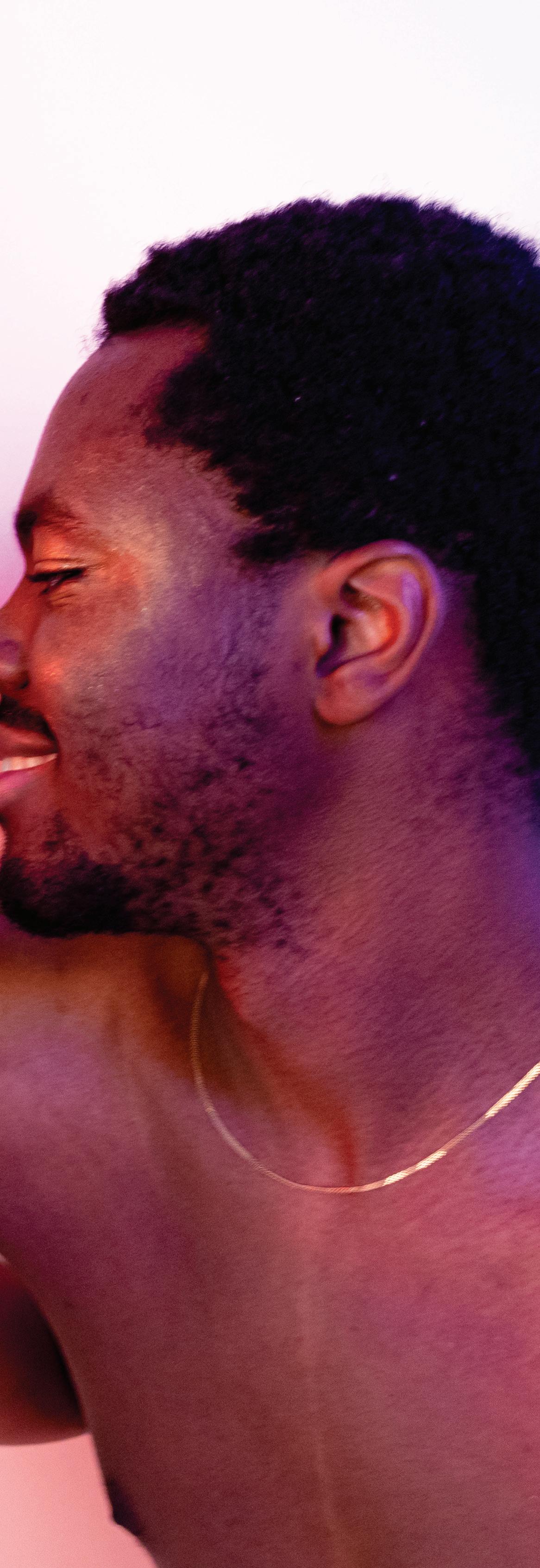
Navigating sexual and reproductive services at university can be tricky, but there’s programs on and off-campus available for support.
Student Health and Wellness at Western University offers services for students in need of support. Faculty and staff at Western can receive care from the school’s Family Practice Clinic located in Thames Hall.
The clinic’s general practitioner physicians offer many sexual and reproductive health services, including sexually transmitted infection testing, pap tests, family planning counselling and birth control. The clinic also provides counselling and vaccinations for human papillomavirus and Hepatitis
A and B. Student Health does not em-
ploy gynecologists, but its physicians can refer students to specialists if required.

Sarah You, an HBA1 student at the Ivey Business School, says she had a positive experience at Western’s sexual health services.
You has received a variety of services from Student Health — STI tests, birth control pills and the HPV vaccine — and recalls it was straightforward. She felt well-informed throughout the process.
“The experience of getting my first [birth control] prescription was very smooth,” says You. “The doctor was walking me through the options and discussing each of them. They have been doing great for me and I’ve been using them ever since.”
Oral contraceptives — known as birth control pills — are covered under Western’s student health insurance plan, PurpleCare. The insurance plan covers 80 per cent of the cost of prescription medications, including contraceptives.
Contraceptives that are a part of the health plan include Plan B, a drug used to prevent pregnancy the day after sex by blocking ovulation, fertilization or fertilized egg implantation and intrauterine devices.
Although Student Health has a variety of available services, it only offers medical abortions. It does not offer surgical abortions.
Medical abortions involve a pill called Mifegymiso, a combination of
two drugs called Mifepristone and Misoprostol. A medical abortion has a 95 to 98 per cent effective rate. The pill is free for women in Ontario with a valid provincial health card, and can be taken within 10 weeks after the first day of one’s last menstrual period.
Surgical abortions involve the removal of the embryo or fetal tissue from the uterus. These types of abortions can be offered up until the 24th week of pregnancy. Western students seeking a surgical abortion can receive one at Victoria Hospital, located in South London.
Miller, a third-year psychology student, has received two abortions at Victoria Hospital. The Gazette is not giving
Miller’s first name for her privacy. After confirming the pregnancy at Student Health’s clinic with a urine sample, Miller decided to terminate. She spoke to one of the on-campus doctors who gave her a sheet with information for the women’s health clinic at Victoria Hospital.
Receiving an abortion at the Pregnancy Options Program clinic takes several steps. Patients must book an appointment with a doctor to discuss options and attend an initial clinic visit for an ultrasound to learn about the process.
During her first appointment, Miller says she was told about the abortion process, including the recovery, birth
control and available social support.

“The staff at Victoria Hospital did an excellent job of making me feel safe, comfortable and validated in my decision,” says Miller. “I was thoroughly informed every step of the way and treated with kindness and compassion.”
Miller recommends students to book an appointment with Western’s Student Health services if they are considering seeking support.
“Although I had a lovely experience at Victoria Hospital, it’s an experience that I would have rather not endured,” she says. “Birth control can be expensive. Take advantage of your student health benefits while you have them.”
TheLGBTQ2+ community includes countless identities that reflect many ways of experiencing gender and sexuality. The community is constantly evolving, which can make it difficult to keep up with all the new queer terminology — luckily, the Gazette has you covered.
Many define their sexuality as fluid — meaning it is in a constant state of change — and on a spectrum. There is no linear path, nor a “one size fits all” to figuring out who you are and what you like. Maybe because of this, we’re seeing an ever-growing number of microlabels, which are hyperspecific labels within the queer community that can fall under umbrella terms such as lesbian, gay, bisexual, trans and queer. For example, bisexuality can act as a spectrum or umbrella term which microlabels like pansexual, polysexual and omnisexual can fall under.
As queer discourse grows, society’s understanding of queer terminology deepens. As such, it’s extremely important to respect that these identifications are necessary and significant. Not everyone wants a label, but for those that do, they can be keys to understand themselves better and feel connected to a community.
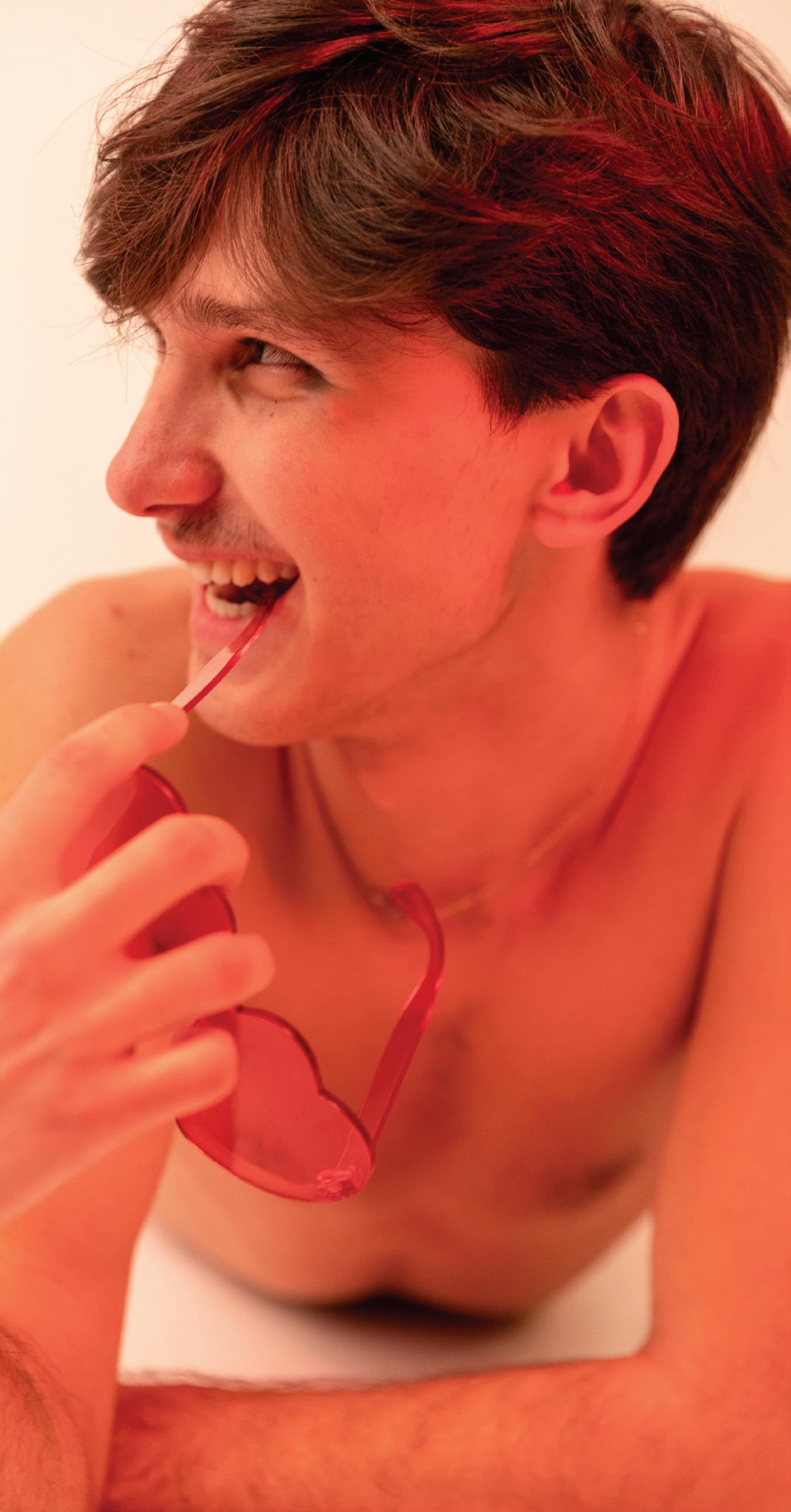
LGBTQ2+ is an evolving acronym used to signify Gay, Lesbian, Bisexual, Transgender, Queer (or Questioning) and Two-Spirit people collectively, and the plus is included to demonstrate the many more sexual identities that aren’t included in the acronym.
Here are a few of the many identities which fall under the plus.
A term used to communicate sexual or romantic attraction to men, males or masculinity. This term intentionally includes attraction to those who identify as men, male or masculine, regardless of biology, anatomy or sex assigned at birth.
Falls on the asexuality spectrum and is defined as being “repulsed by the idea of engaging in sexual activity.”

Describes asexual people who don’t experience sexual attraction but still have the desire to engage in sexual behavior or a sexual relationship.
A person who may only experience sexual attraction after a strong emotional attachment is formed.
One who experiences romantic attraction towards strangers or those they are unfamiliar with, which fades once they get to know the person.
A person who identifies in the “gray area” between asexuality and sexuality.
A term used to communicate sexual or romantic attraction to women, females or femininity. This term intentionally includes attraction to those who identify as women, female or feminine regardless of biology, anatomy or the sex assigned at birth.
A romantic orientation on the asexuality spectrum which describes an individual who feels romantic attraction towards others, but who does not desire reciprocation of that attraction or does not wish to enter a romantic relationship.
Omnisexual is similar to pansexual and can be used to describe people who have a romantic, emotional or sexual attraction to people of all genders.
A person who is emotionally, romantically, sexually, or otherwise attracted to people regardless of their gender identity or sex assigned at birth.
A person who chooses not to subscribe to a label for their gender or sexuality.
An attraction to multiple genders and/ or sexes.
Someone who is sexually attracted to non-binary-identifying individuals.
It’s important to know these are just a few terms, and that sexuality doesn’t need to have a label. To label or not to label is a choice unique to each person. But, these choices are what allow us to understand the breadth of gender and sexuality, and uncover what our identity really means.
Birth control pill
• A guy had an asthma attack while giving me head, still finished tho so he’s a trooper
• Hooking up with someone in my friend group at home when on my period then gaslighting her into thinking she was the one that bled everywhere
• Guy pulled out a flashlight to “see” my vagina while attempting to eat me out. It was quite literally the worst experience ever.
• I was having birthday sex with my girlfriend at the time, and I received a call from my grandma, and she was calling from Nigeria so I felt like I should answer otherwise I’d be wasting her call minutes, so I pulled out and listened to her wish me a happy birthday and quickly talked to her and then went back to having sex
44.9% had sex without contraceptives
45.9% would consider a threesome
34.7% would not consider a threesome
0.6% prefer not to say
26.7% have sex a few times a week
19.8% haven’t had sex
10.9% once a month
11.2% once every other week
65.4% have not been to sex toy bingo
34.2% have been to sex toy bingo
0.4% prefer not to say
42.4% have trimmed pubic hair
13.1% are natural
89.3% have not cheated
2.8% everyday
17.4% every few months
8.4% once a week
2.9% prefer not to say
52.3% have not had sex without contraceptives
0.7% prefer not to say
2.2% prefer not to say
42.3% are shaved or bare
6.9% have cheated
1.0% prefer not to say
44.9% have had sex without contraceptives
2.1% are unsure
3% are unsure
0.8% prefer not to say
4.8% do not believe in monogamy
14% are unsure
4.7% lost their virginity younger than 14
40.9% between 15-17
28.5 between 18-20
4.8% between 21-23
1.2% between 24+
0.4% prefer not to say
19.4% haven’t lost their virginity
80.2% believe in monogamy
• Asking me about dinosaurs (I’m an archeologist)
• i know the exam fucked you, when’s it my turn?
• You put the sexy in dyslexic
• i want to be Taylor Swift’s sex slave
• A strapping Scottish lad from the historical past who time travels into my bedroom in a kilt
• Enemies to lovers
• Former Speaker of the House Mitch McConnell doing “anything” for my vote
Entering university as a first-year student can be terrifying. But the new labels attached to who you are can be the most terrifying part — enter “the virgin.”
One of the most common stressors of beginning university involves dating, relationships and, of course, sex. For people who didn’t have sex in high school, coming into a university atmosphere where condoms are blown up into balloons for someone’s birthday can be intimidating.
But what even is a “virgin?”
According to the Cambridge Dictionary, a virgin is “someone who has never had sex.”
While definitions surrounding virginity can be tricky, defining what sex is can be even more confusing.
Lauren Forster, a Western University alumna from media, information and technoculture, sees the current definition of virginity as overly simplistic and heteronormative.
“[The current definition] doesn’t really even define what sex is,” says Forster. “When we say sex, in relation to virginity, what we’re talking about is penetration. That’s not necessarily what sex is. Many people have many different forms of sex.”
Forster asserts “virginity is a culturally created ideal” and argues “the un-
derstanding of virginity needs to shift from being a purely literal definition, in relation to just someone that hasn’t had sex, towards an understanding of it as more of a cultural phenomenon.”
Forster started her journey at Western having not had sex. When she began exploring her sexuality in her first year, she noticed a change.
“When I did begin kind of exploring sexually in university, I think I started to pick up on … ‘I’m seeing myself now in a different way. How are other people seeing me?’”
John Luo, a second-year sociology student, also grappled with this idea of virginity in his first year at Western.
Luo lived in China before coming to Canada and attended a Catholic high school. Both environments shared the belief that you shouldn’t have premarital sex.
“When I came to Western, and I realized how open people are about [sex] … it was a little odd at first, but then I realized I was the weird one for not doing it,” he says. “At first, I was like, maybe I should engage in this sort of hookup culture, but I realized it’s not really for me.”
Luo noticed the stigmas surrounding virginity in conversations with his peers at Western.
“If someone quote on quote still is a
virgin, people would make fun of them for being either not attractive physically, or [for having] an off-putting personality.”
Publicly shaming “the virgin” is not new at Western. A banner stating “our roommate is a virgin pls help” was hung on a house on Broughdale Avenue during 2019 FOCO.
Forster notes that these stigmas and shame surrounding “virginity” are also tied to our concepts of gender.
“My friends who were men were facing very different kinds of pressures and stigmas about being a virgin than my friends that were women,” says Forster.
Luo suggests these different gender roles can be attributed to power imbalances between genders.
“If a guy said that they were a virgin at a certain age, people [would] clown on him. But, if a girl said that … everybody’s like, ‘Oh, I mean, that’s respectable,’” he says.
These gendered stigmas surrounding “virginity” are also tied to sexual and gender-based violence. In June 2019, Western issued an apology for a convocation speech by Canadian Musician Stephan Moccio.
In this speech, Moccio shared a memory from his time at Western when he saw a sign that said, “thank
you fathers for dropping off your virgin daughters.” Moccio has since apologized for this comment.
Forster also notes the language we use to talk about virginity, such as virginity being “taken” from us, is violent.
“As someone that identifies as a woman, I have felt like I am basically the vulnerable or like a passive party in the exchange of virginity,” says Forster. “[Virginity] shouldn’t be seen as some-
thing that can be given or taken.”
Given the various pressures surrounding sex in university beyond, Forster and Luo both agree that if you think the timing is right and you are comfortable, the decision is yours — and that you shouldn’t “lose it” because other people have.
“Your sexual life, as long as you are being responsible and kind, is not anyone else’s business,” Forster says.

“Whether you’ve lost your virginity, and you feel weird about that, or you haven’t lost your virginity, or you have lots of sexual partners, [say that] ‘whatever I decide to do with my body, as long as I am doing it in a kind and responsible way to others, is okay.’”
So, do you really need to begin your university career with a (literal) bang?
Fuck that, or don’t — it’s up to you!
Whenyou stick a bunch of 18 and 19-year-olds in a tight living space, hookups are bound to happen.
The question is, why do people care so much about it?
At Western University, the act of hooking up with someone on your floor — colloquially known as “floorcest” — has become a staple of residence culture.
For many, living in residence is the first time they have their own freedom to experiment and explore who they are as people — including their sexuality. It’s a process that’s both natural and part of developing into the next stage of life, and should not be discouraged and stigmatized.
There’s a reason why Western has such a stigma around floorcest — it’s something that’s been handed down from generation to generation. It’s not uncommon for residence sophs to bring it up right at the start of Orientation Week. Once its reputation for controversy grows, it becomes an excuse for first-years to gossip.
Even the word “floorcest” — in part derived from the word incest — is problematic. It implies that floorcest is gross, shameful and a crime against your university “family” — your floormates.
The “punishment” for engaging in floorcest — a candlelit dinner in the residence cafeteria — only adds to the drama.
In practice, sophs only set up that event for floormates they believe will see it as fun,
games and a funny story to tell their friends back home. In most cases, if sophs believed it would seriously embarrass a student, they’d use their judgement to give the floormates an out.
But even with leaders using their best judgement, the existence of the dinner itself can create anxiety for students and add to the notoriety that floorcest has. These candlelit dinners are a practice that shouldn’t continue.
Engaging in floorcest is certainly riskier than other relationships. If the involved people handle their relationship immaturely, it’s not like they can simply avoid each other — especially in traditional and hybrid residences. Not only will the people in the relationship have to see each other all the time, but their floormates can and often do get caught in the middle.
Sometimes, the floor vibes are never the same.
But the stigma surrounding floorcest punishes and shames the people who partake in it, and can place additional pressure on first-years during a time where they are just starting to mold into the university version of themselves.
Whether you partake in floorcest, avoid it at all costs or believe something in between, don’t judge others for their actions.
Live and let live. Your floor will thank you later.




 By Sophia Schiefler
By Sophia Schiefler
How does one pick the perfect picture for their dating profile? By using the one with your ex at prom, of course.
Dating apps have become the easiest way to meet new partners, giving users the ability to scroll through potential candidates without leaving their house. While a lot of people are using sites like Tinder and Bumble, not everyone is doing it right.

Luckily, the Gazette has all of the tips you to ace the dating app game and increase the number of people swiping left on your profile.


Nothing quite activates someone’s primal caveman instinct and makes them send that “hey :)” message faster than an iconic photo of someone holding their freshly-caught fish. After all, that’s why people download dating apps in the first place: to find someone that can hunt to provide for them. Make sure to include this photo (or photos!) in your profile so everyone knows you are the real catch of the day.
Posing with your group of friends in all of your photos shows that you have a great social life, that you like to have fun and probably are a great person to be around. Don’t be discouraged if the messages you’re getting are asking about your better-looking friends. At least people are messaging you.
Let’s be honest: we all looked our best at 15-years-old. There’s nothing like a duck face CamWow selfie to show that you are hip and with the times. After all, the different haircut and tan you’re sporting in those photos will inevitably lead to the best possible start of a first date: having them walk right by you.




Remember that photo of you and your ex that you looked really good in? You can still post that, just crop them out! Make sure to leave half of their dismembered arm in the photo, and bonus points if you’re lovingly gazing at them out of frame. If anything, it shows everyone that you can commit, are open to relationships and still have a deep emotional attachment to another person.
Dating apps aren’t just a way to find a potential partner or hookup, they’re an opportunity to express your inner self. Particularly, if your interests include travelling, working out, watching movies, drinking coffee and sports. If you share the same five interests as everyone else on the app, you should have huge success. There’s also no better conversation starter than sharing your controversial opinion on whether pineapple should be on pizza. Be yourself, everyone else is taken!






Listen, everyone knows 5’10” is basically six feet and 5’8” is basically 5’10”. It’s not your fault the tall genes skipped a generation in your family. You can always wear platform shoes when you meet in real life. They’ll never know the difference.

WhenSophia Wright finished the deed with her high school boyfriend, she looked over at him and thought: “This can’t be it, right?”
It was only until years later, when she got to university, that she first heard of the term “orgasm gap.” Since then, Wright has learned more about her sex life and orgasm equality.
“I didn’t even really know what an orgasm was for a woman at that time,” says Wright, now a fourth-year psychology and gender, sexuality and women’s studies student.
The orgasm gap is the difference in orgasm rates between men and women during partnered sexual experiences. In general, men are much more likely to experience orgasm than women.
“I was also still focused on, ‘Well, I’m not supposed to come, so why does it matter?’” says Wright, describing her mindset back in high school. “You get fed this narrative for such a long time — you do have to retrain yourself and unlearn these harmful things.”
A 2017 study analyzing a sample of over 50,000 United States adults found a significant gap in frequency of orgasm during sex between heterosexual men and women. Heterosexual and gay men reported orgasming 95 and 89 per cent of the time respectively, whereas bisexual and heterosexual
women were the lowest, orgasming 66 and 65 per cent of the time. Bisexual men and lesbian women were reported to orgasm 88 and 86 per cent of the time.
Jaclyn Siegel, a social psychologist who completed her PhD at Western University in 2021, now teaches at San Diego State University. Siegel has a whole lecture dedicated to the orgasm gap in her psychology of human sexual behaviour course.
Siegel says there are a variety of factors that affect the orgasm gap, one being poor understanding of female sexual anatomy and the type of stimulation needed for someone with female sexual anatomy to orgasm. This often includes clitoral stimulation.
“There’s an ongoing cultural joke that no one knows where the clitoris is, which is not funny. It’s sort of pathetic,” says Siegel.
But lack of information about female sexual anatomy is almost universal. Oftentimes, young women don’t know much about their sexual anatomy either, creating a huge barrier in communicating with their partners about how they can reach an orgasm.
Wright didn’t know she had a clitoris until she was 15 years old — she didn’t even know what it looked like.
“I took a mirror and I was like, ‘Where the fuck is it?’” says Wright.
Looking back, Wright is astounded at just how little she knew about her own body. She recalls not even knowing urine came out of the urethra until she watched an episode of Orange is the New Black
“We talk about sexual empowerment, sexual equality and the playing field being even now for women and men in heterosexual hookups — but it’s not true,” says Siegel.
Her Ontario public school sex education was unhelpful. She never learned about masturbation, pleasure or orgasms in school.
The lack of information she received about female sexual anatomy — along
I think a lot of women do it because sex sometimes is super fucking boring. Sex just sucks sometimes. It’s like: ‘How do I get this over with? Let me make the loudest porn moaning noise that I can for me to get the fuck out of this.’
with feeling like she wasn’t as thin as attractive women were typically depicted in the media — led her to feel shame about her body.
“I still feel shame around my vagina,” says Wright. “That was something when I got to university that I really had to get through: ‘Why am I feeling so much shame towards my own body? Why do I hate this part of my body so much?’ I felt so bad for people having sex with me.”
This self-consciousness led Wright to decline oral sex — a common way for people with female sexual anatomy to reach clitorial stimulation and achieve an orgasm — even when her partners offered.
Siegel says predominating sexual
scripts — cultural attitudes and norms towards how sex is supposed to go — priotitizes those with male sexual anatomy over those with female sexual anatomy.
“If you genuinely believe a sexual experience is over as soon as a person with male sexual anatomy has an orgasm, you might not feel entitled to an orgasm because you think the sexual experience is over,” says Siegel.
While Siegel does cite men’s sexual entitlement as a contributing factor to the orgasm gap, she adds it’s important to not paint all men with broad strokes.
“In conversations, people are very quick to blame men for the orgasm gap. But women contribute to this by not telling their partners what type of
stimulation they need,” says Siegel. “It’s not necessarily that men don’t want to help, they might not know how.”
A 2021 study found that when women are socialized to be more sexually assertive, it can lead to more frequent orgasms and higher sexual satisfaction.
Siegel attributes the patriarchy as the reasoning behind a woman’s hesitation in communicating what they sexually like. Women may feel like their pleasure doesn’t matter to their partner, or that speaking up may hurt their partner’s feelings and make them feel inadequate.
This leads to another factor Siegel strongly believes contributes to the orgasm gap: women faking their orgasms.

A 2015 study surveying 4,685 university students at the University of Maine found that 70 per cent of sexually-active women reported having faked an orgasm.
“When you lie to your partner by pretending you’ve had an orgasm, they don’t learn how to actually give you an orgasm. You reinforce behaviours that didn’t produce the outcome you wanted,” says Siegel.
While Wright has never faked an orgasm personally, she understands why many others do.
“I think a lot of women do it because sex sometimes is super fucking boring,” says Wright. “Sex just sucks sometimes. It’s like: ‘How do I get this over with? Let me make the loudest porn
moaning noise that I can for me to get the fuck out of this.’”
Wright’s journey to sexual empowerment has been long and ongoing. She says it’s taken a lot of unlearning predominating sexual narratives and ideas of what women’s bodies are supposed to look like to get to where she is today.
Her current partner noticed she was struggling to orgasm during their first few months of dating, when they bought her a vibrator to throw into the mix. An attentive partner and a shift towards a more positive mindset about her own body has resulted in a vast improvement in Wright’s sex life. Another thing Wright’s learned? She’s allowed to finish first.

“We should all be pursuing positive sexual experience,” says Siegel. “There are a variety of ways we can move toward orgasm equality, some of which are on women, some of which are on men.”
According to Siegel, there’s still work to be done — talking more about female sexual pleasure and learning more about the bodies of people with female sexual anatomy are just the start.
“You must understand your own body before you hope someone else will understand it,” says Siegel. “Get comfortable with yourself, figure out ways to make yourself feel good.”
Exploring your body comes in many different forms, from masturbation to experimenting with sex toys. Once you understand how you receive pleasure, it’s crucial to communicate that to your partner and emphasize your sexual pleasure is important too.
If your partner is unresponsive? Leave.
“The only people who are worth having sex with, are the people who are willing to do what they need to do to give you a positive sexual experience,” says Siegel.
An orgasm isn’t essential to having a satisfying sexual experience, but for many, it’s an enjoyable part. Bringing more attention to the orgasm gap is essential to achieving orgasm equality.
“People deserve to have pleasure,” says Wright. “It’s jarring when we see men receiving that pleasure more than women.”
As for Wright’s high school boyfriend? She got rid of him a long time ago. Her current partner is attentive and lets her feel her pleasure is important too.
As a Catholic, there’s a lot I feel guilty about. The institution of the Catholic Church is responsible for atrocities such as residential schools and sexual assault scandals.
There is a personal level of guilt as well. The implied pressure to remain “pure” to avoid “going to hell” is a toxic mindset that can affect a young person’s psyche at the most vulnerable time in their lives.
As someone who spent 14 years in the Catholic school system, I can confirm that this pressure is very real.
Growing up Catholic shaped my worldview. Whether it be self-image or relationships with others, a Catholic education guilts you into believing there is one right way to approach sexuality — denying its existence.
To say my education was old fashioned would be an understatement.
There was immense pressure to live up to a standard of “purity.” Strict dress codes focused on being conservative — my friends and I were criticized if our shorts hit too high above the knee or, God forbid, a bra strap was visible. All to avoid “distracting” male classmates. Somehow, girls bear the responsibility to police not only their sexuality, but their male classmates’ too.
The notion that my body was something to be ashamed of made me feel guilty just for being a teenage girl.
This raging misogyny was later emphasized by how my school approached sexual education.
Preaching abstinence outside of marriage — where masturbation, sex and watching porn were considered to be breaking your commitment to God — is a damaging idealism to be surrounded by. It caused me to grow up believing that any sexual thoughts
were immoral, despite it being a perfectly natural part of puberty.
No one taught me how to face the pressures of hookup culture in university or how birth control can be used for more than avoiding pregnancy.
Coming to Western University expanded my horizons, and retaught me to embrace my sexuality. The people I met were open and honest about sex — I overheard more than one group discussing it over dinner in the Saugeen-Maitland Hall cafeteria. I learned that sexuality is not something evil or to be avoided at all costs. Discussing sexuality and sex can be healthy and enlightening.
Having those open discussions with friends changed my perspective on myself and the people around me.
The sense of shame I had associated with sexuality began to disappear. I didn’t deserve to feel bad for being a normal teenager just because I grew up going to church every Sunday.
It’s important to embrace your desires as they help you understand yourself and where you stand in relation to others.
By creating a culture of repression in schools, the Catholic community leaves their children vulnerable. Not everyone takes the time to learn what they were not taught and question what they were, furthering a cycle of miseducation and guilt.
While I am grateful to the community I was raised in, I have learned to let go of some of the archaic values that came with it.
Growing up, religion was important to me. But now, Catholicism’s power over me has been replaced with a newfound understanding of sexuality and identity — something my school neglected to teach me.



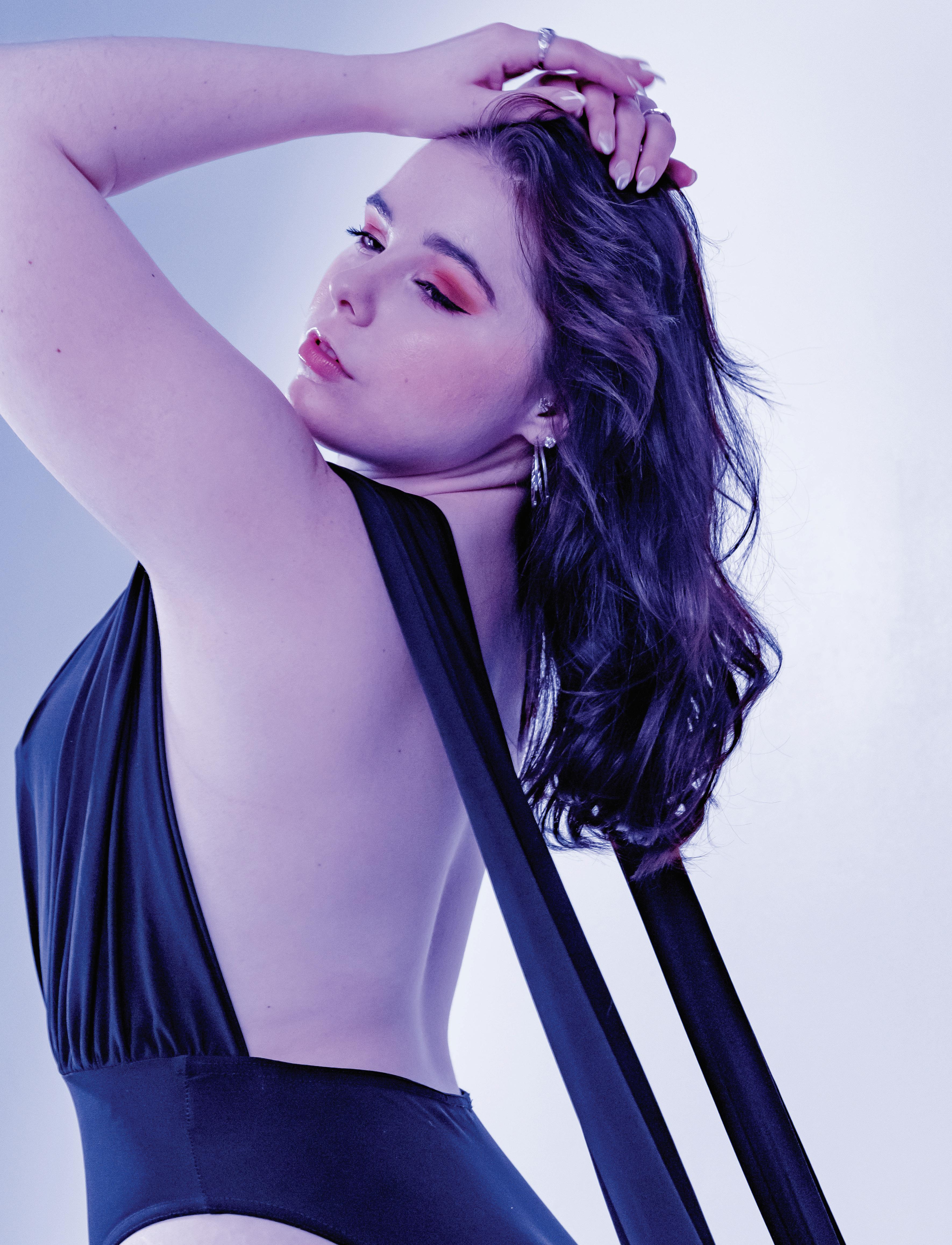 By Ryan Goodison
By Ryan Goodison

Youpicked out the outfit, you got the reservation, but you’re missing one thing: fragrance. You need to make a good impression, but you don’t want to come off too strong — literally.
Perfumes and colognes are some of the most commonly used accessories. They’ve been worn from as far back as ancient Egypt — Cleopatra was known to use perfumes, especially when seducing her suitors.
Fragrances are an essential tool in forming intimate relationships — if you smell good, you look good. Almost everyone has their go-to scent, but why are some fragrances more popular, and which are worth trying?
Often it comes down to the individual notes within the fragrance itself. Those particular scents that humans just can’t get enough of.
And for those of you who wear Axe… it’s time to stop.


If you are looking to make an impression on a first date, musk will certainly help you along.
Initially created from the sex gland secretion of the Tibetan musk deer, musk has an irresistible and powerful quality that humans cannot get enough of. Musk is so popular because of its complex aroma, which has many different notes.
In fact, it was believed that a single drop of musk could last over 40 years. However, most musk-based fragrances today use synthetic compounds and don’t require the deer to make them.
Although most musk fragrances are best for winter, white musk can help you make it through the summer.
When summer comes calling, it is time to pull out some citrus fragrances. Citrus fragrances are extracted from the zest of oranges, lemons and grapefruits.
Studies have shown that your body is energized just by smelling citrus — it’s fantastic for a much-needed pickme-up. A 2012 study found that citrus smells can increase alertness and shorten response times. Oranges specifically have been shown to increase penile blood flow in men by 19.5 per cent.
Citrus works best when added to a heavier, earthier note — giving a fuller body to the smell.

Tobacco is among the most popular fragrances marketed toward men. Mysterious, but somehow familiar, tobacco can pair well with other notes or stand on its own when needed.
People have often described the smell of tobacco as sexy and mysterious. It has even been noted that some people find the smell of tobacco as addicting as cigars and cigarettes.
Tobacco has been incorporated as a note in many popular unisex fragrances, and is best used in the fall and winter seasons.
Lavender is one of the most popular and widely recognized notes in perfume. It’s often paired with wood, pine or citrus, and works well for every season.
Human beings have used lavender for its calming properties since ancient times. A 2013 study suggests lavender can not only relax the human body, but it raises arousal levels in humans.
Although lavender-based fragrances are usually marketed towards women, more colognes have started to add lavender, among other notes.
Leather remains a popular staple in colognes across the globe. Leather and perfume go back as far as 2000 B.C.E. when the material was initially scented to eliminate its odour. In Asia, leather was perfumed with the bark of the Kumquat tree.



The earliest known adopter of leather as a cologne was King George III of the United Kingdom. He liked the smell of scented leather gloves so much he asked for it to be made into a fragrance.
It’s actually not possible to obtain the smell of leather from the object itself — instead, perfume and cologne have to use other notes and ingredients like tar, wood, tobacco and smoke to create a replica scent. These notes are uniquely powerful and give leather fragrances their allure.

Leather is often described as suave, elegant and cool. The note is often paired with others to create a more complex scent.


 By Elizabeth Hart
By Elizabeth Hart
Unlike its lacklustre name, this position will give you anything but a boring sight to see. The Concrete Beach lets you see a new view of your partner. Instead of being on top of one another, this variation involves being on your sides and creating a flat — or concrete — shape with your bodies.





Nothing says Western pride like paying respect to the local geese. Sit cross-legged with your partner and intertwine your bodies for maximum intimacy. Feel free to try this position on grass or in water to really embody the spirit of Western’s favourite bird.
Is there anything better than a fresh Spoke bagel? Maybe trying a new sex position! The Spoke Poke is a great way to avoid eye contact with your partner, and the standing position allows access to locations that are just as versatile as your bagel order.





You don’t need a zoo of people to finish with the Saugeen Single. Looking for sex as intimate as your one-bedroom dorm? Ride solo and have fun without a partner. Just like a single room, you can invite people over, but can kick them out if they’re stopping you from getting the job done.


Try out this aerobic challenge paying homage to the body of water that runs through Western University’s campus. The blood rushing to your head from doing a bridge is just the start of the intense high you’ll get in this Gazette-approved position.

Visiting Middlesex College doesn’t have to be a solo or two-person task. It can always be a group activity! Nothing beats getting to know others better, and this certainly is one way to do it. Talk about a friendship worth remembering!

IfTV has taught me anything, it’s that nobody deserves Sandra Bullock, and also that I’m not eligible for the “one size fits all” version of happily-ever-after we see on screens.
A lot of fictional romances model themselves after fairy tales, where problems are simple and romantic love conquers all. Though it makes for cute clichés that are sweet in moderation, the sheer amount of unrealistic stories we consume makes it hard to not have unrealistic expectations in real life.
When I was growing up, the TV romances I consumed were usually punctuated with a marriage — something that I didn’t think was available to little, closeted me. And it didn’t help that the only people shown having happy endings were a skin tone lighter than me.
Throwaway dialogue didn’t help either — side characters usually emphasized that love is the ultimate reason-to-be and that the protagonist is crazy for thinking otherwise.
These lines feel rather archaic in hindsight, like screenwriters wanted me to drop everything and fulfil my destiny of being a husband in a picturesque, white nuclear family.
Luckily for me, I’m an anxious homosexual who’s a bit too tan to pull that off.
To clarify, I’m not calling for the abolition of rom-coms — I love a good fictional romance that makes me blush and kick my feet under my blankets. And I know it would be logistically impossible to do justice to every form of love in a two-hour made-for-television pro-
gram. I just want more nuance. I just want romantic dialogue to stop implying that people are broken if they aren’t romantically-involved.
The human experience is too vast to say that every person is destined for the usual romance, then marriage.
Plenty of couples are happy never tying the knot. Plenty of people are happy without a romantic partner. Hell, plenty of people are happy without potato chips — meaning anything is possible.
There are so many different ways to live that it feels a bit naive to idealize romance to the point where expectations become unrealistic.
I’ve seen acquaintances go into relationships expecting their missing half, only to find a fully-formed, complex person. Even friends who are well into their happily-ever-after love still have problems that would be considered unbecoming of a “fairy tale romance.”
I’m painfully aware that true love’s kiss won’t pay my bills or be a proper substitute for my antidepressants. But for a long time, I thought life might be dramatically better if I could have a “happy-ending” romance, just like in the movies.
I don’t know what my own fairytale ending is going to look like, but I do know that I’m going to have one. It might be with a partner, or it might not.
But I know one thing for sure: it’s going to involve potato chips and lying in bed.






One of these stories is written by ChatGPT. Try and figure out which one it is.

when we were dancing in my kitchen or lying in my bed, just two women alone in the world, I felt myself complete. Maybe in the next life.
It was my first day back to work after leaving for a few months. It was the holiday season, so the store was hectic to say the least. There were so many new employees, I barely recognized any faces. You were one of the people I hadn’t met yet. Aftering working only a few shifts together, I knew you would become one of my best friends. I was debating whether I should even go back to that job, but I am forever thankful that I did because I got to meet you.

I get dressed in the morning, put on my makeup and admire myself in the mirror. “I look nice today,” I tell my reflection, smiling — bringing to life the words that you could never say to me. I walk to campus alone, my hands buried deep inside my own coat pockets, admiring the winter scenery and listening to songs that don’t make me sad anymore. I feel so full and warm. It turns out the magic that I was looking for in you was actually inside of me all along.
It was a cool, clear night, and I was beet-red. I had just sent off a text, and mulled over his possible reactions until I got a flirty response disguised as an insult. Every text was a rally of banter, and every text left me kicking my feet under my blankets like a little idiot. I never thought I’d find queer romance beyond a pile of seedy dating apps, but I’m endlessly thankful. Even if it doesn’t lead anywhere, I’ve experienced something that I never thought would be available to someone like me: a meetcute crush.

I don’t believe in past lives. But if scientists come out tomorrow and announce it’s true — that we’ve all lived a thousand lives before this one and will live a thousand after — I will believe it because of her. Her laugh, the smile when she rolled her eyes, the sarcastic lilt of her voice — all were familiar to me from the day we met. We’re not meant to be together; complexities in lifestyle have decided that for us. But in those fleeting moments
You got me out of bed in the morning. I dragged myself out from the warm covers on those cold days in the winter semester just so I could see you in the cafeteria. You were always so inviting, keeping me company before morning class. Somehow, you glowed under the harsh fluorescent lighting. I loved how you felt in my hands; so soft. You tasted so sweet. What I wouldn’t do to unwrap you one more time. I miss you, Elgin Hall croissants.

















On the first day of third year, my grandfather passed away. He was my hero, and I had wanted him to be with me at my graduation. My grandmother believes every time she sees a cardinal, it’s a sign from him. On my graduation day, as I was leaving my house, I saw a cardinal on the little maple tree in our walkway. I knew it was his little way of saying he was proud of me. He’s always with me — sometimes, I just need the reminder.
I remember the day my little sister was born like it was yesterday. Watching her take her first steps and hearing her say her first word was one of the most amazing moments of my life. Now, my little sister is in high school, and I can’t believe how fast the time has gone. Even though she’s grown up and doesn’t need me as much as she used to, I still feel protective of her
and want nothing but the best for her. I’m grateful for the bond we share, and I know that no matter how old we get, we will always be sisters.
My parents have never been overly affectionate with each other. No memories of exchanging “I love yous” or stolen kisses cross my mind. Their love is hidden in the small things. From their daily walks around the neighbourhood and every late-night car ride where my mom knits while keeping my dad company. It’s my mom making my grandma’s black forest cake every year for my dad’s birthday and my dad warming up her side of the bed for her. They don’t need to be boastful; their quiet love speaks volumes. My parents were destined for each other.
I’m a fan of lists. Mine used to be simple. 10 a.m.: class, 3 p.m.: laundry, 5 p.m.: you. I repeated my chores every day until I got to my favourite part — you. Time went on and somehow you appeared less. Maybe your lists got too long. Now I fill my lists with silly tasks from morning to night — anything to distract me from the fact that you’re not on them anymore. No matter what, I like to leave a space where your name might go. “Just in case,” I say. In case you missed me on your list, too.





I’ve always been the person to put others first. While I was proud to be the socalled “therapist friend,” I wasn’t actu-











ally taking care of myself. This year, I got out of a toxic relationship that took a huge toll on my mental health. I cut off friendships that weren’t giving me a lot of that same energy I was putting in and started renewing the relationship with myself. It’s amazing what can happen when you put yourself first and the new relationships that can come into your life when you truly love yourself. Or, at least, when you’re on the way there.
I can’t pinpoint the first memory I had. Looking back, everything is a blur growing up, but one person remains constant. My best friend, who has been an ever-present light in my life. The one person I can turn to no matter what and instantly feel better. It’s hard to articulate this type of unconditional love, whether we’re driving together to get a coffee blasting show tunes or sending silly text updates about our day. I appreciate each and every moment we have together now that I’ve moved away from home. Though this is a tiny love story, the happiness I feel from her is infinite. I love you, Mom.
The Monday to Friday pick up every morning before school. The drive consisted of the same playlist and grey fabric car seats. The ten minutes that never failed to change my mood from half awake and dreading my classes to being eager to start the day. Driving to school with my best friend never failed to make my days better. And the best thing was that I could look forward to it again the next day.





You get sentimental when you’re reflecting on four years of your life. But a lot of the time, I think about the little things. Five girls crammed in the living room, trying to piece together puzzles. The frenzied, hectic dinners, piling over each other to claim a burner on the stove. The movies we watched with the girls next door, with the projector stacked on top of shoeboxes and a stool. It’ll never be the same after this, and I don’t want it to be. On our way out, let’s just remember to turn off the oven.

